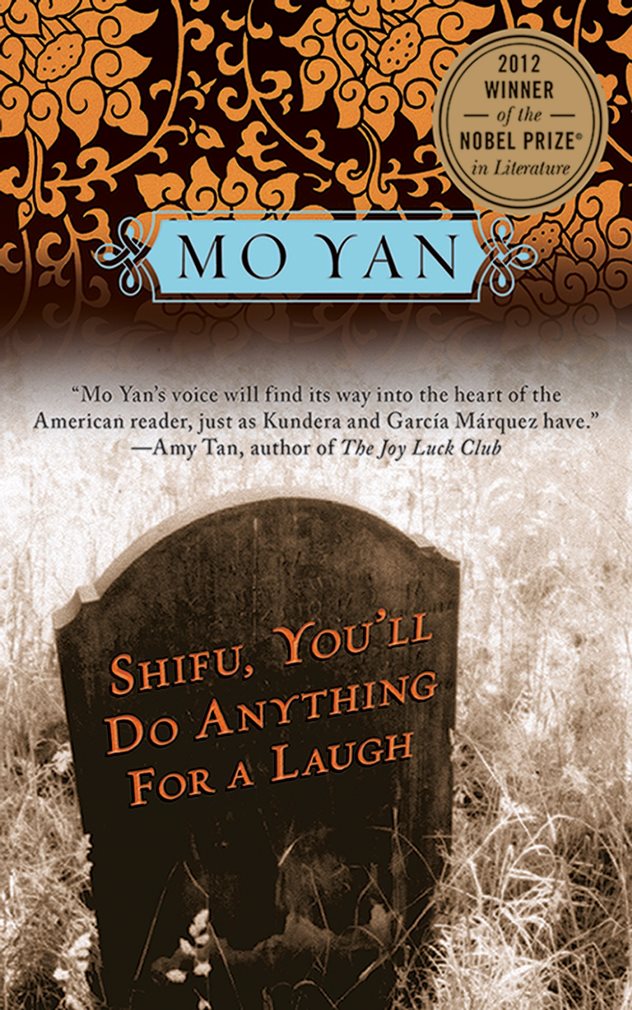I have set myself a reading target of 12 books for the month of December and “Shifu, You’ll Do Anything For A Laugh” by Mo Yan is the first book that I have finished reading.
“Shifu, You’ll Do Anything For A Laugh” is a collection of eight abrasive, bizarre and imaginative stories written in the 1980s and 1990s that give an unusual insight into China. The stories have been masterfully translated into English by Howard Goldblatt,
Mo Yan is a pen name which means ‘Don’t Speak’ and it was adopted by the author Guan Moye because he has a tendency to talk too much. This comes, he says, from one of his two muses: loneliness (the other is hunger). Winner of the 2012 Nobel Prize in Literature Mo Yan, China’s most critically acclaimed author, has altered the face of China’s contemporary literature with such daring and masterly novels as Red Sorghum, The Garlic Ballads, and The Republic of Wine.
The slightly bawdy title novella of this collection, which has been adapted to film by the award-winning director Zhang Yimou, chronicles the plight of factory worker Ding Shikou (Ten Mouth Ding) who is laid off just a month from retirement after 43 years of dedicated service that has earned him the honorific title of Shifu. After contemplating his options, Ding decides to take an entrepreneurial approach, converting an abandoned bus into a love cottage for rent to couples to have trysts. It turns out to be a good venture as he is able to make a good income from it. But one tryst appears to go terribly wrong and fearing retribution, he confesses to the authorities, with surprising and darkly comic results.
“Man and Beast” evokes some of the horrors committed by Japanese soldiers in China during World War 2. A Chinese soldier, captured and conscripted by the invading Japanese, is sent to work in Hokkaido during the early days of World War II. Having witnessed atrocities committed by the Japanese, he makes a daring escape and takes refuge in a fox cave amidst a forest on a mountain, where he lives, alone, for the next ten years. He becomes half man and half beast, and in a grand battle, he and two foxes face off.
A young reluctant bride develops the power to fly like a bird to escape an arranged marriage in “Soaring,” a magical tale with an ugly twist. Being unable to fly neither high nor far, the villagers shoot her down like the bird or demon they believe her to be.
“Iron Child” is a surreal story set against the very real deprivations of the Great Leap Forward, about two children who learn to eat iron in the absence of real food. It sounds almost like a post-apocalyptic tale and is inspired by the author’s own experiences of almost unimaginable poverty as a child.
“The Cure” demonstrates the way traditional beliefs still held sway alongside local politics during the Cultural Revolution. Told that only a human gall bladder will cure his elderly mother’s cataracts, a filial man and his son hide under a bridge to await the falling bodies of people executed by the Armed Work Department, executions that were so commonplace during the madness of the Cultural Revolution.
“Love Story “ is a about a young urban girl sent to the village during the Cultural Revolution, where she has sex with a younger local boy who is just experiencing the onset of adolescent love and physical desire. It seem to suggest that there is only sex, not love.
“Shen Garden” is a poignant account of a middle-aged man meeting his former lover, coming to terms with compromised choices and abandoned dreams. The woman, whom he had met in a small town a long time ago, tries to rekindle their love but she finds that the man no longer reciprocates her feelings. It illustrates the idea that “not a single thing in this world is eternal” as the two former lovers return to their spouses after their fleeting rendezvous.
“Abandoned Child,” the last story in the collection, tackles the friction between the notorious one-child policy and the pervasive notion that daughters are second best. A man finds an abandoned baby girl only a few hours old. What follows are the reactions of the man’s family, which has honoured the One Child law by having only a daughter though they have longed for a son. When the man takes the baby to the local authorities, the full impact of his good deed hit him like a horror tale.
In this collection, Mo Yan has successfully examined the Chinese society through a variety of lenses, creating what feels more like a buffet sampling of a life lived through a turbulent half-century of China’s history.
 CY@CY Says Welcome to my dreamscape. Where a Lim is also a Ling.
CY@CY Says Welcome to my dreamscape. Where a Lim is also a Ling.
